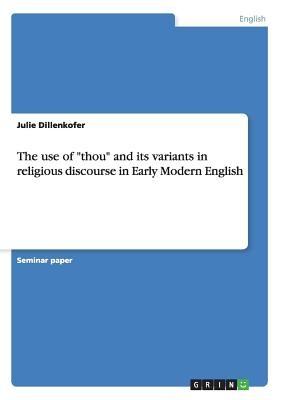
- We will send in 10–14 business days.
- Author: Julie Dillenkofer
- Publisher: GRIN Verlag
- Year: 2015
- Pages: 24
- ISBN-10: 3668034877
- ISBN-13: 9783668034877
- Format: 14.8 x 21 x 0.2 cm, minkšti viršeliai
- Language: English
- SAVE -10% with code: EXTRA
The use of thou and its variants in religious discourse in Early Modern English (e-book) (used book) | bookbook.eu
Reviews
Description
Seminar paper from the year 2012 in the subject English Language and Literature Studies - Linguistics, grade: 1,0, University of Heidelberg (Anglistisches Seminar), course: Historical Pragmatics, language: English, abstract: "You" is an unusually versatile personal pronoun; it is "used to address two or more persons, animals, or personified things" and "thus" indicates the nominative and accusative in both singular and plural. However, you has not always been the only second person English pronoun. In Old and Middle English, there were various pronouns differentiating among gender, person, case, number including dual number. By the time period of Early Modern English, the number of pronouns was restricted and - eventually - three different forms came to be used as the nominative second person pronoun: you, ye and thou (alternative spelling: thow). In general, thou was used as the singular form, whereas ye and you were used for the plural. At the beginning of Early Modern English, ye was used as the nominative second person pronoun, while you was primarily used as the correspondent accusative form. However, in the course of the Early Modern English period, you supplanted ye as the nominative but maintained its use as the accusative form as well. On the other hand, by the end of the Early Modern English time period, you expanded its use to both the singular and the plural form and has remained that way ever since (cf. Barber 1997; Görlach 1993; Nevalainen 2006).
EXTRA 10 % discount with code: EXTRA
The promotion ends in 21d.17:26:56
The discount code is valid when purchasing from 10 €. Discounts do not stack.
- Author: Julie Dillenkofer
- Publisher: GRIN Verlag
- Year: 2015
- Pages: 24
- ISBN-10: 3668034877
- ISBN-13: 9783668034877
- Format: 14.8 x 21 x 0.2 cm, minkšti viršeliai
- Language: English English
Seminar paper from the year 2012 in the subject English Language and Literature Studies - Linguistics, grade: 1,0, University of Heidelberg (Anglistisches Seminar), course: Historical Pragmatics, language: English, abstract: "You" is an unusually versatile personal pronoun; it is "used to address two or more persons, animals, or personified things" and "thus" indicates the nominative and accusative in both singular and plural. However, you has not always been the only second person English pronoun. In Old and Middle English, there were various pronouns differentiating among gender, person, case, number including dual number. By the time period of Early Modern English, the number of pronouns was restricted and - eventually - three different forms came to be used as the nominative second person pronoun: you, ye and thou (alternative spelling: thow). In general, thou was used as the singular form, whereas ye and you were used for the plural. At the beginning of Early Modern English, ye was used as the nominative second person pronoun, while you was primarily used as the correspondent accusative form. However, in the course of the Early Modern English period, you supplanted ye as the nominative but maintained its use as the accusative form as well. On the other hand, by the end of the Early Modern English time period, you expanded its use to both the singular and the plural form and has remained that way ever since (cf. Barber 1997; Görlach 1993; Nevalainen 2006).


Reviews